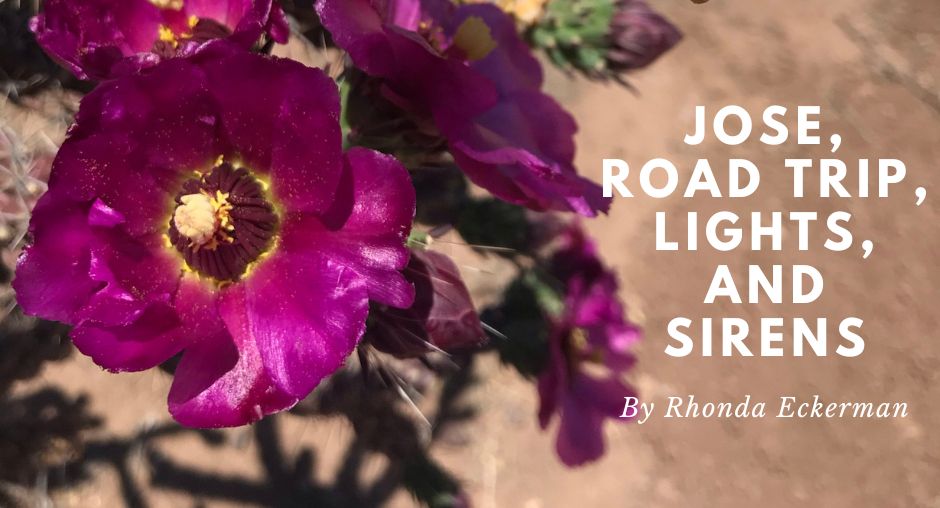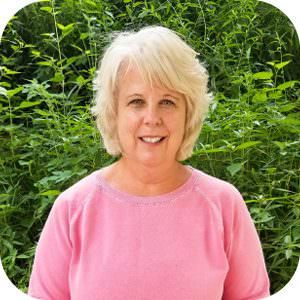JOSE, ROAD TRIP, LIGHTS, AND SIRENS

Editor’s Note: Overseas Lay Missioner Rhonda Eckerman reflects on her encounter with suffering and injustice along the U.S.-Mexico Border.
Early one morning at the Migrant Resource Center in Agua Prieta, Mexico, I noticed a young man in the courtyard sitting apart from the group looking very sad and scared. I noticed he had several scratches across his face and despite knowing that these cuts would probably heal without much fuss, I used that as an excuse to bring him into the center. The center has a quiet space away from the 50 other brothers and sisters who were recently returned back into Mexico by U.S. Border Patrol. As I began cleaning the scratches on his forehead, nose and cheek, I could feel him relax.
I learned his name was Jose, and he had been walking in the desert with his wife for over 10 days. It was a tough 10 days as he had fallen several times, gotten lost, and had a limited supply of food and water. Sadly, he explained through tears that he does not know if his wife is with Border Patrol or still walking alone in the desert. He began to sob as the days of stress, worry, and frustration came to the surface. I sat with him as he called home, still sobbing as he told his wife’s family the horrible news. I was there when he made a second call, again overcome with emotion. As my shift came to a close, I learned his wife had not arrived at the migrant center and that Jose had made the decision to wait for her at our overnight shelter.
With my shift finished, I was invited on a road trip with several of the sisters from the School Sisters of Notre Dame. The trip had several goals. First, to relax and admire the God’s beautiful creation. Second, to spend time with each other away from the center. And lastly, to check on a wooden cross that had been planted years ago. Wooden crosses are planted throughout this county in memory of migrants who lost their lives in the desert. The crosses are planted near to where their body are located and are carved with their name, date their body was found and, if known, their birthday. In many cases, nothing is known of the body found. It is then that the cross will have the word “no identificado” or “no identificada” if female. There are over 300 crosses planted throughout Cochise County. The road trip started in Douglas, an Arizona border town, and headed east along the wall. Despite the land scarred with a 30-foot high rusty metal obstruction, God’s land is beautiful. There are rolling hills, mountain ranges, and desert floors painted with flowers of orange, yellow, and purple.
We located Blanca Elizabeth Aleman’s wooden cross easily and were relieved that it had not been tampered or removed. Yet, I found the view from her cross distressing. Blanca’s cross is next to the old fence that previously separated Mexico from the U.S. and in the background, the border wall. What a sad reflection on how times have changed.

Picture of the cross, the old border fence and in the background, the border wall. Six months after this picture was taken, the cross disappeared.
After spending some time at the cross praying for the life lost and the family left behind, we began our journey back to Douglas. As we navigated the rocky gravel roads we were surprised when we heard sirens behind us. We were pulled over by three Border Patrol vehicles using both lights and sirens. Three Border Patrol officers approached the driver’s side window; one of them asked us questions while the other two officers searched the car. After several tense minutes, the officer told us they were looking for a “different white SUV” and told us to go on our way.
On the border, days like this are common. You don’t know what the day will bring or who you will meet. I was honored to be in Jose’s life for that brief moment; I think of him often. I wish I could tell you that his story has a happy ending, but I have no information on Jose or his wife. I find comfort in praying for him and all the migrants walking the desert.
Tagged in:

